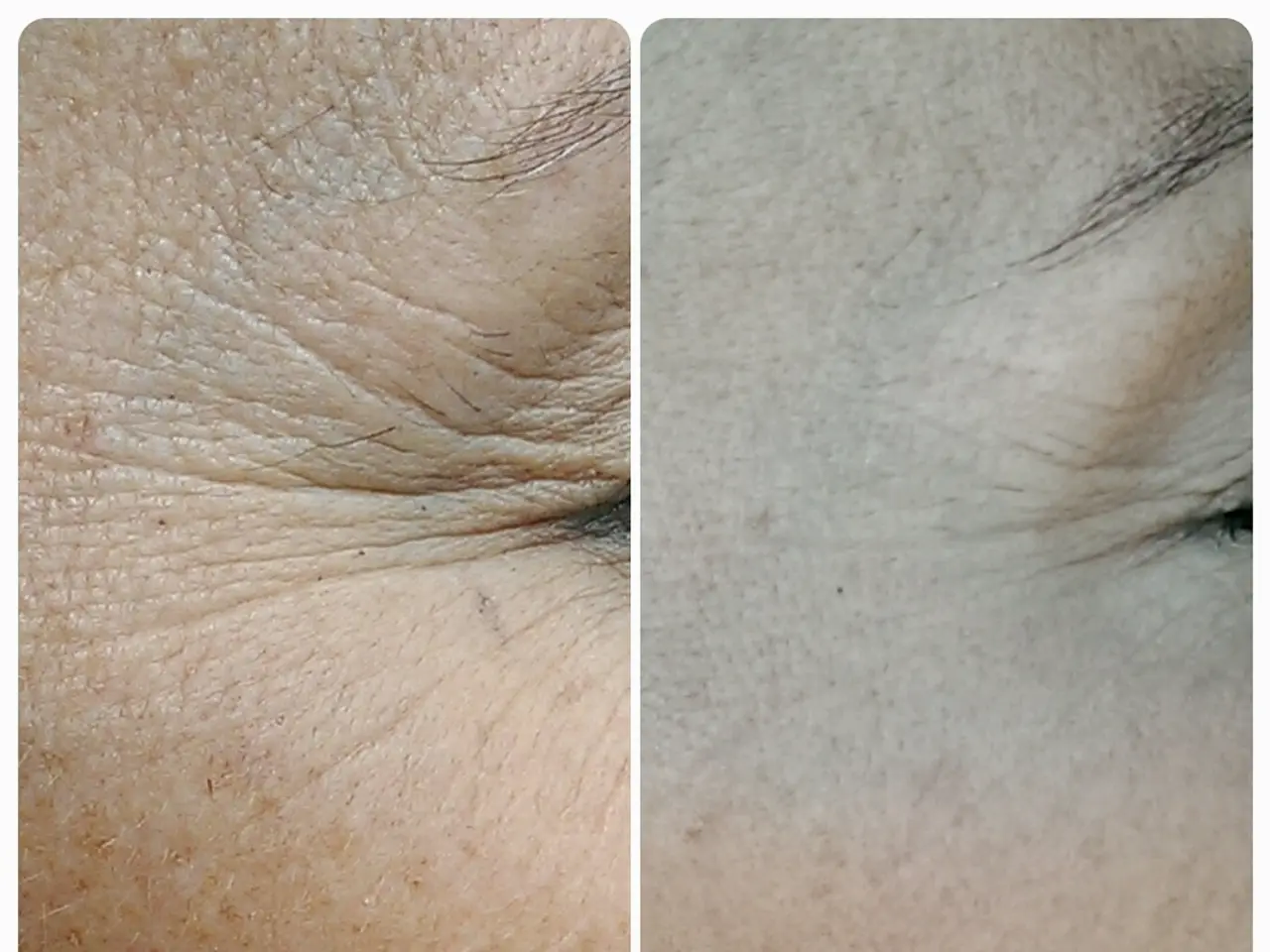Skincare Routine Sequence: The Appropriate Order Based on Skin Variety
AADA Recommends Daily Skin Care Routine for Oily Skin
The American Academy of Dermatology Association (AADA) has outlined a specific skin care regimen for individuals with oily skin. This routine, designed to maintain a healthy skin barrier and control excess oil and breakouts, consists of four main steps: cleansing, treating, moisturizing, and protecting.
- Cleanse: Use a gentle, clarifying face wash twice daily (morning and evening) that removes dirt, oil, and impurities without stripping or damaging the skin’s natural barrier. For oily or acne-prone skin, cleansers containing salicylic acid or benzoyl peroxide are effective to unclog pores and control excess oil.
- Treat: Apply targeted treatments like serums containing salicylic acid, lactic acid, or retinoids to exfoliate gently and reduce breakouts. Use these either as spot treatments or on the entire face to help unclog pores and reduce redness.
- Moisturize: Even oily skin needs hydration. Use a lightweight, non-comedogenic moisturizer (such as a gel or lotion) that keeps skin balanced without causing excess shine or clogging pores.
- Protect: Finish with a broad-spectrum sunscreen every day to protect the skin from UV damage. Choose formulations suited for oily skin that won’t clog pores or cause irritation.
Additional tips from the AADA include avoiding harsh scrubbing or over-stringent astringents and toners, which can worsen oiliness and irritation. Instead, gentle toners without alcohol can help maintain skin’s pH balance.
In sum, a recommended daily routine for oily skin according to the AADA is:
- Cleanse twice daily with a gentle, oil-controlling cleanser
- Apply targeted treatments with salicylic acid or retinoids
- Moisturize with a lightweight, non-comedogenic product
- Apply sunscreen daily
This routine supports oily skin without over-drying, helping to maintain a healthy skin barrier and control excess oil and breakouts effectively.
It's important to note that individuals with rosacea may find it challenging to find products that do not irritate their skin. In such cases, it's advisable to consult a healthcare provider or dermatologist for further guidance and possible treatment options.
Lastly, if persistent symptoms of acne develop, symptoms of rosacea become worse, skin issues become constant or troublesome, or when new skin issues appear, it's crucial to seek advice from a dermatologist.
- Drug-related science plays a significant role in dermatology, especially in understanding medical conditions such as rosacea and chronic diseases like cancer.
- Understanding the connection between these skin conditions and related science is essential for the beauty industry in developing effective skincare products.
- Respiratory conditions, digestive health, eye health, hearing, and overall health and wellness are areas beyond skincare that the medical field focuses on.
- Fitness and exercise, sexual health, and autoimmune disorders are other vital aspects of men's health that require attention and care.
- Women's health encompasses topics like aging, pregnancy, and parenting, and it is equally important to address these concerns.
- Cardiovascular health is crucial for maintaining a healthy lifestyle and preventing various heart-related issues.
- The skincare products industry has grown exponentially, with retailers catering to diverse needs and lifestyles, such as fashion-and-beauty enthusiasts, food-and-drink lovers, and education-and-self-development advocates.
- Accounting for lifestyle preferences, some retailers offer organic skincare products, while others incorporate CBD into their skincare lines, addressing the demands of consumers looking for alternative treatments.
- Lifestyle choices like fitness-and-exercise, investing, wealth-management, home-and-garden maintenance, and other business endeavors are all part of personal-finance management.
- Personal-growth and personal-finance affiliated with banking-and-insurance services are intertwined with data-and-cloud-computing technology solutions, ensuring secure transactions and financial advice.
- Maintaining good health requires regular check-ups for various health conditions, including skin conditions, respiratory conditions, digestive-health issues, and even neurological disorders.
- Efficient healthcare management is crucial to addressing the wide range of chronic diseases, from cardiovascular-health challenges to neurological disorders.
- Eye-health and hearing services are essential for diagnosing and treating various diseases and ailments related to vision and auditory systems.
- Fitness-and-exercise programs help enhance overall health and well-being, contributing to better heart health, stronger muscles, improved flexibility, and reduced stress levels.
- In addition to improving physical health, a balanced diet rich in nutrients, vitamins, and minerals is beneficial for digestive health and supporting various bodily functions.
- Preventing ear infections, maintaining eye health, and safeguarding hearing are critical for maintaining overall wellness and avoiding hearing loss or vision problems.
- Mental health and neurological disorders like anxiety, depression, and other psychiatric disorders can have a significant impact on an individual's daily life and relationships.
- Autoimmune disorders such as lupus, rheumatoid arthritis, and multiple sclerosis are complex medical conditions that require ongoing care and management.
- Pets contribute to emotional wellness, providing companionship, stress relief, and helping manage various health issues, including conditions like hypertension and cardiovascular disease.
- The financial industry has seen significant advancements in technology, including online banking, crypto, stock trading, and digital wallets, making it more accessible and efficient for consumers.
- Realizing the benefits of technology, many companies have embraced telemedicine and digital health records, improving accessibility to healthcare services and facilitating remote consultations.
- Streamlined data management allows healthcare providers to monitor and manage patient conditions more efficiently, leading to improved treatment outcomes and overall patient care.
- Social-media platforms have become powerful tools for connecting people, sharing ideas, and staying informed about current events, industry trends, and celebrity news.
- In addition to representing an entertainment source, movies-and-TV shows have allowed numerous social and political issues to be discussed, depicted, and addressed with diverse perspectives.
- Career-development is crucial in various sectors, including finance, technology, education, and entertainment, as it enables individuals to grow professionally and reach their full potential.
- Finance and casinos are interconnected in ways that fuse gambling and investment opportunities, attracting a vast audience eager to win, invest, or enjoy entertainment.
- Netting huge wins or landing job promotions can add to the thrill of living, but maintaining long-term financial stability requires planning, saving, and making smart investments.
- Balancing personal finance, mental health, and caring for pets requires diligence, discipline, and seeking guidance from professionals, like wealth managers and finance advisors.
- Embracing a healthy lifestyle means dealing with potential issues intelligently, such as seeking help for cognitive function or eye health when needed.
- Preventative measures like wearing sunglasses, getting regular hearing checks, and staying informed about insurance options can protect one's hearing, eyesight, and pocketbook.
- Sports enthusiasts connect with athletes, teams, and communities, making sports a focal point for entertainment, fitness, and social interaction.
- Popular sports like football and soccer promote teamwork, camaraderie, and sportsmanship, while empowering players and fostering role models.
- Supporting local teams and cheering on players creates a sense of belonging and contributes to community building, without neglecting essential aspects of health and wellness.








